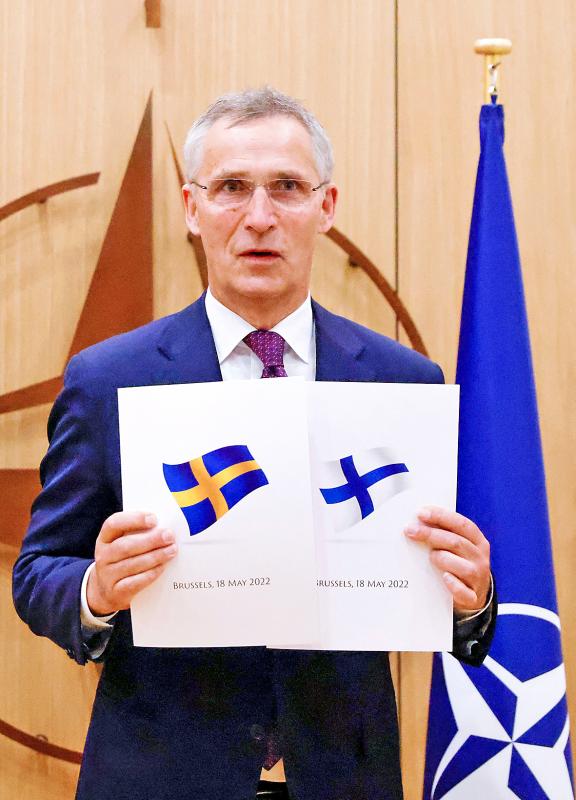Sweden and Finland yesterday formally submitted their applications to join NATO, confirming a radical redrawing of Europe’s security landscape triggered by Russia’s invasion of Ukraine.
NATO Secretary-General Jens Stoltenberg accepted the Nordic neighbors’ membership applications, each in a white folder embossed with their national flag, at the headquarters of the US-led defensive alliance in Brussels.
“I warmly welcome the requests by Finland and Sweden to join NATO. You are our closest partners,” Stoltenberg told the two countries’ ambassadors, hailing the occasion as “a historic step” and “a good day at a critical time for our safety.”

Photo: AFP
NATO ambassadors were expected to discuss the applications yesterday and could give the green light to opening formal talks with the pair on their requests, but Turkey has raised objections that could delay or even derail the process.
All 30 NATO members need to approve the enlargement, which must then be ratified by their parliaments, taking up to a year. The alliance has said it wants to move as fast as possible given the potential Russian threat over Finland and Sweden’s heads.
“The security interests of all allies have to be taken into account and we are determined to work through all issues and reach rapid conclusions,” Stoltenberg said. “All allies agree on the importance of NATO enlargement. We all agree that we must stand together and we all agree that this is an historic moment which we must seize.”
Ankara has said its objections are rooted in what it describes as Sweden and Finland’s support for members of Kurdish militant groups, and their decisions in 2019 to impose arms export embargos on Ankara over Turkey’s military operations in Syria.
Helsinki, Stockholm and the other Western allies have said they are optimistic they can overcome Turkey’s objections. Many analysts believe that Turkish President Recep Tayyip Erdogan, who faces elections next year, is seeking concessions for domestic political advantage and unlikely ultimately to veto the applications.
In the hope that speedy ratification by the US would help advance the process, the Swedish defense minister has already headed to Washington and is to be followed by Finnish President Sauli Niinisto and Swedish Prime Minister Magdalena Andersson, who are due to meet US President Joe Biden today.
If successful, the applications would represent the most significant expansion of NATO in decades, doubling the alliance’s border with Russia, which has repeatedly warned it would be forced to respond to “restore balance” after what it called “a serious mistake.”
However, Moscow’s response has so far been relatively muted, with Russian President Vladimir Putin describing Finland and Sweden’s accession as not a threat in itself.
Only the deployment of military infrastructure on their territories would provoke a response, Putin said.

Right-wing political scientist Laura Fernandez on Sunday won Costa Rica’s presidential election by a landslide, after promising to crack down on rising violence linked to the cocaine trade. Fernandez’s nearest rival, economist Alvaro Ramos, conceded defeat as results showed the ruling party far exceeding the threshold of 40 percent needed to avoid a runoff. With 94 percent of polling stations counted, the political heir of outgoing Costa Rican President Rodrigo Chaves had captured 48.3 percent of the vote compared with Ramos’ 33.4 percent, the Supreme Electoral Tribunal said. As soon as the first results were announced, members of Fernandez’s Sovereign People’s Party

EMERGING FIELDS: The Chinese president said that the two countries would explore cooperation in green technology, the digital economy and artificial intelligence Chinese President Xi Jinping (習近平) yesterday called for an “equal and orderly multipolar world” in the face of “unilateral bullying,” in an apparent jab at the US. Xi was speaking during talks in Beijing with Uruguayan President Yamandu Orsi, the first South American leader to visit China since US special forces captured then-Venezuelan president Nicolas Maduro last month — an operation that Beijing condemned as a violation of sovereignty. Orsi follows a slew of leaders to have visited China seeking to boost ties with the world’s second-largest economy to hedge against US President Donald Trump’s increasingly unpredictable administration. “The international situation is fraught

MORE RESPONSIBILITY: Draftees would be expected to fight alongside professional soldiers, likely requiring the transformation of some training brigades into combat units The armed forces are to start incorporating new conscripts into combined arms brigades this year to enhance combat readiness, the Executive Yuan’s latest policy report said. The new policy would affect Taiwanese men entering the military for their compulsory service, which was extended to one year under reforms by then-president Tsai Ing-wen (蔡英文) in 2022. The conscripts would be trained to operate machine guns, uncrewed aerial vehicles, anti-tank guided missile launchers and Stinger air defense systems, the report said, adding that the basic training would be lengthened to eight weeks. After basic training, conscripts would be sorted into infantry battalions that would take

GROWING AMBITIONS: The scale and tempo of the operations show that the Strait has become the core theater for China to expand its security interests, the report said Chinese military aircraft incursions around Taiwan have surged nearly 15-fold over the past five years, according to a report released yesterday by the Democratic Progressive Party’s (DPP) Department of China Affairs. Sorties in the Taiwan Strait were previously irregular, totaling 380 in 2020, but have since evolved into routine operations, the report showed. “This demonstrates that the Taiwan Strait has become both the starting point and testing ground for Beijing’s expansionist ambitions,” it said. Driven by military expansionism, China is systematically pursuing actions aimed at altering the regional “status quo,” the department said, adding that Taiwan represents the most critical link in China’s